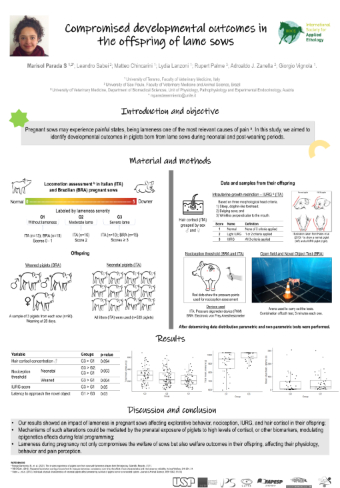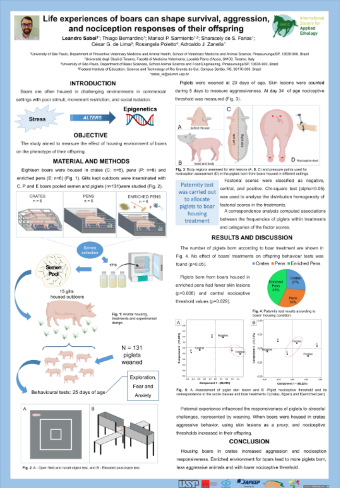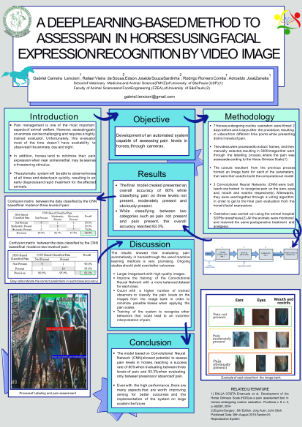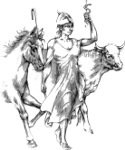Notícias e Eventos
O CECSBE é premiado no ISAE
O ISAE (International Society for Applied Ethology) é o maior e mais importante congresso ao nível mundial na área de etologia aplicada e bem-estar animal. O nosso grupo de pesquisa (CECSBE, Centro de Estudos Comparativos em Saúde, Sustentabilidade e Bem-estar) tem participado há mais de 5 anos, levando sempre a inovação e qualidade que caracteriza nossas pesquisas. No presente ano, na versão 54 do congresso, três dos nossos trabalhos foram apresentados, dois dos doutorandos Leandro Sabei e Marisol Parada (premiado como terceiro melhor pôster do evento), e um trabalho de iniciação científica do estudante de Veterinária / FMVZ, Gabriel Lencioni. Abaixo podem ser apreciados os pôsters e vídeos enviados ao evento.
Compromised developmental outcomes in
the offspring of lame sows

Life experiences of boars can shape survival, aggression, and nociception responses of their offspring

A deep learning-based method to assess pain in horses using facial expression recognition by video image

 Journal of Applied Animal Welfare Science
Journal of Applied Animal Welfare Science
- Positive Reinforcement Training Improves Behaviour and Welfare of Captive Indian Leopards (Panthera pardus fusca)
- The Value of a Statistical Life of a Cat: Owner Demographics and Management Practices Impacting Willingness to Pay for Welfare Measures
- Evaluation of Dairy Heifer Calves Submitted to Hot-Iron Branding: Behavior, Infrared Thermography, and Mechanical Nociceptive Threshold
 Nature Reviews Neuroscience
Nature Reviews Neuroscience
- Rethinking excitation/inhibition balance in the human brainNature Reviews Neuroscience, Published online: 23 June 2025; doi:10.1038/s41583-025-00943-0The balance between neural excitation (E) and inhibition (I) shapes cognition, development and brain-based disorders. Electroencephalography and magnetic resonance spectroscopy allow non-invasive quantification of the E/I ratio but yield discrepancies that challenge their use in this context. Addressing these differences is essential for advancing biomarkers and brain-based […]
- Examining the biological causes of eating disorders to inform treatment strategiesNature Reviews Neuroscience, Published online: 20 June 2025; doi:10.1038/s41583-025-00940-3Recent years have seen a growth in our understanding of the biological drivers of eating disorders and their interactions with environmental and psychosocial factors. Foldi and Griffiths consider how interdisciplinary research, dimensional diagnostic approaches and improved animal models may enable the development of more effective treatments for […]
- Three-photon microscopy: an emerging technique for deep intravital brain imagingNature Reviews Neuroscience, Published online: 20 June 2025; doi:10.1038/s41583-025-00937-yOptical microscopy allows neural cells to be studied in the intact brain, but imaging deep neural tissue presents substantial challenges. Prevedel and colleagues outline the principles of three-photon microscopy, highlighting its advantages for deep tissue imaging and its applications in neuroscience.
